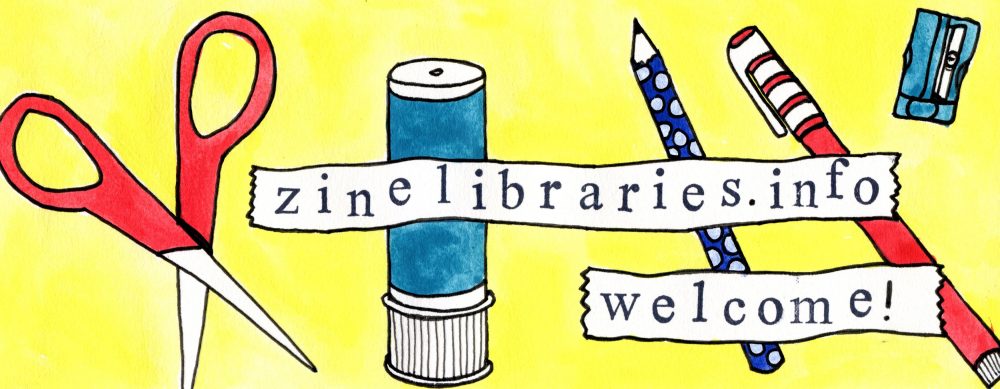Collection Policy Primer As Determined By Your 10th Grade Journalism Teacher or The Five Double-Us and An Ach
At the 2014 Zine Librarians unConference (ZLuC) we talked quite a bit about collection policies and why they’re important for all different types of libraries and reasons. Here it is, presented as notes that a cub reporter would ask when working on their first stories.
Who?
You! More specifically, whomever is facilitating the zine collection at your library or institution. Generally there is a single point person, but in the case of some barefoot zine libraries there may be a collective or board that can help define a collection policy.
What?
A collection policy is just that… a policy or set of rules or guidelines that determine what your specific zine library focuses on. It can short and sweet, or long and library-speakish, or anything in-between. For example:
QZAP collects zines by folks who self-identify as queer, and also material the is queer, regardless of the identity of the people who created it.(1)
Alternately, here’s a description from the Carnegie Library:
“The Carnegie Library of Pittsburgh Main Zine Collection is made up of the donated Comic Release zine collection, which focuses heavily on comics and art zines, and the general adult zine collection, which also has literary, personal, and various types of informational zines, for example zines on activism, biking, gardening, and zine librarianship. We try to have a collection that is balanced across subject areas and that speaks to community needs and interests.”(2)
A Few Examples
Short:
Timberland Regional Library https://drive.google.com/file/d/1HM6DW-bDo–aokB4jnE9t6pJ4C0wG1NB/view
Jacksonville Zine Collection http://jplzinelibrary.wordpress.com/make-a-donation/collection-development-policy/
Barnard Library Zine Collection https://zines.barnard.edu
Carnegie Library of Pittsburgh Zine Collection http://zinelibraries.info/wordpress/wp-content/uploads/2016/07/2014-12_CLP-zines-collection-policy.docx (Word doc format)
Pacific Northwest College of Art https://docs.google.com/document/d/1fo3qEm_VNxwN1f3YEMlIrxfDyH6N3PTd3UW8i7xTCBQ/edit#heading=h.kkq6mu7bs7xa
Maryland Institute College of Art http://libguides.mica.edu/zines
Long Beach Public Library https://lapl.org/zines/policy
Long:
ZAPP http://zappcatalogingandpreservation.pbworks.com/w/page/50384409/Collection%20Development%20Policy
New Paltz Zine Library http://hawksites.newpaltz.edu/zines/about/collection-development-policy
Long mixed archives/zines:
Fales collection at NYU http://www.nyu.edu/library/bobst/research/fales/rgcolldev.html
Where?
Your library, collection or archive.
When?
Right about now. The funk soul brother.
Why?
Having a collection policy is a good idea for a number of reasons:
* It acts as a guide for your staff, volunteers, patrons, and community members.
* It allows your institution to seek out certain zines that fall within scope while being able to confidently reject material that doesn’t.
* It’s an easy way to say “thanks but no thanks”
* In institutional settings it can be used to defend against folks who want to know why you don’t have issues of Top Gear in the zine collection.
* If you delineate that you won’t take racist, sexist, homophobic or oppressive materials then you can tell the Aryan Brotherhood just where they can stick their copies of Resistance.
How?
* Sit down with some or all of the other stake-holders and figure out what your collection is about.
* Write that shit down.
** Commit it to print in your newsletters and zines
** Publish it on your website
* Refer to it, and ask others to look at it as well.
What Are Some Things I Could Cover?
- A Mission Statement or Statement of Purpose
- A brief overview of your institution
- Audience/ Community Profile (who your users are)
- Selection guidelines
- Responsibility for collecting (who decides? Can you list a position title, or collective name?)
- Formats you do or don’t collect
- Subjects collected
- Regions/geographical areas collected
- Languages of materials collected
- Dates of materials collected
- Diversity statement
- Not about preservation
- Deaccessions (stating whether you will or will not ever get rid of material, and what you will do in that case: return to donor? Give to another library? State here whether you would ever sell duplicates?)
- Sort of the same as the previous category: Unsolicited gifts (ZAPP titles this section “What we do with materials that do not fit the collection”)
Here’s an example from Sarah Lawrence:
Gifts
The library gladly accepts donations but cannot guarantee that the item in question will be added to the collection. Donations will be held to the same standards for inclusion as purchased items. If the item is not added to the collection, the library retains the right to handle the book in the manner that best fits its needs.
(1) QZAP Zine and Queer Zine FAQ – <http://www.qzap.org/v7/index.php/help/80-faqs/74-zine-queer-zine-faq>
(2) Carnegie Library Zine Page – <http://carnegielibrary.org/research/news/zines.html>
This Draft: Milo and Lisa Dee, August 2014

